Thomas James Richards, Diaries, Transcript Vol. 1, 26 August 1914 to 24 April 1915 - Part 7
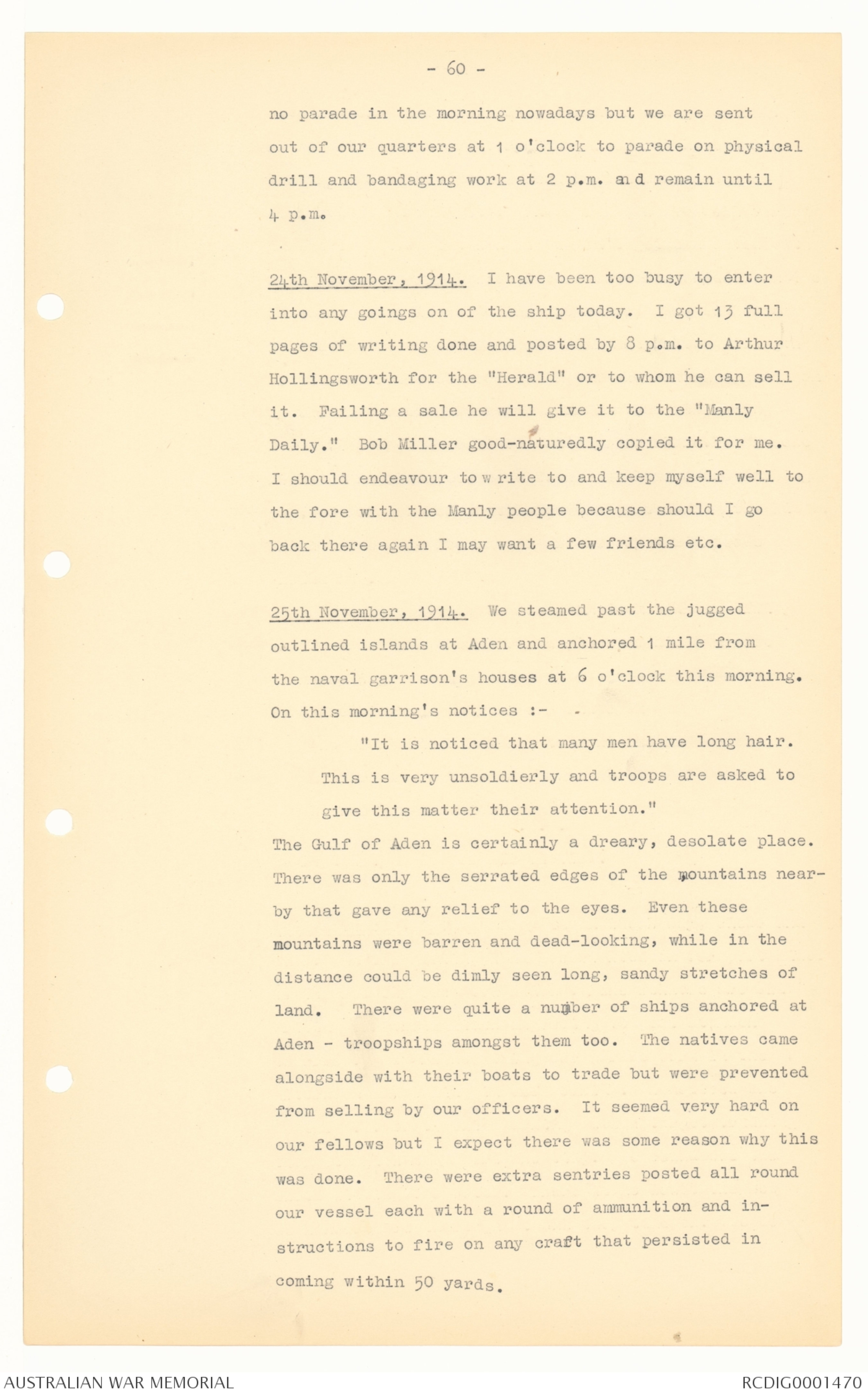
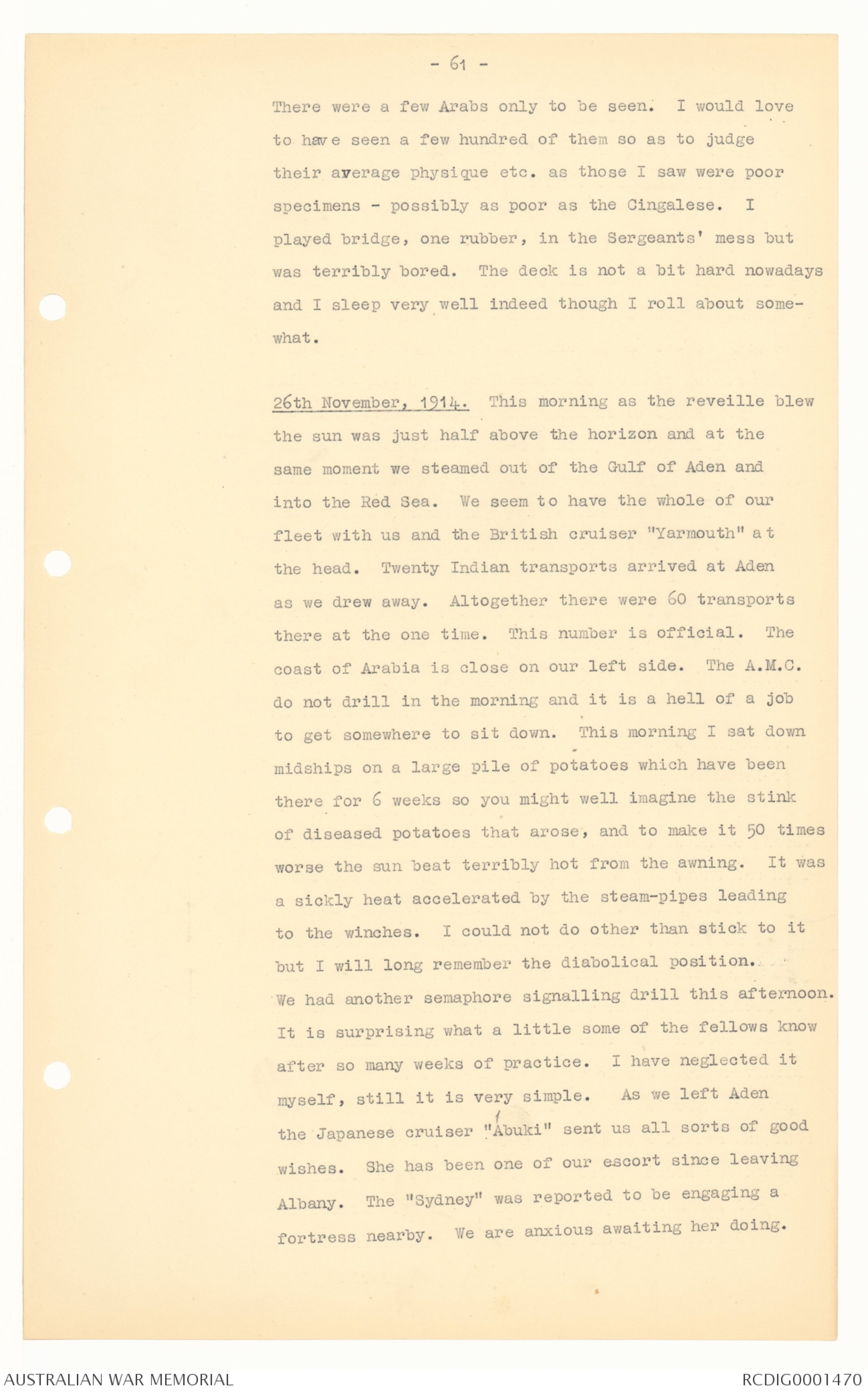
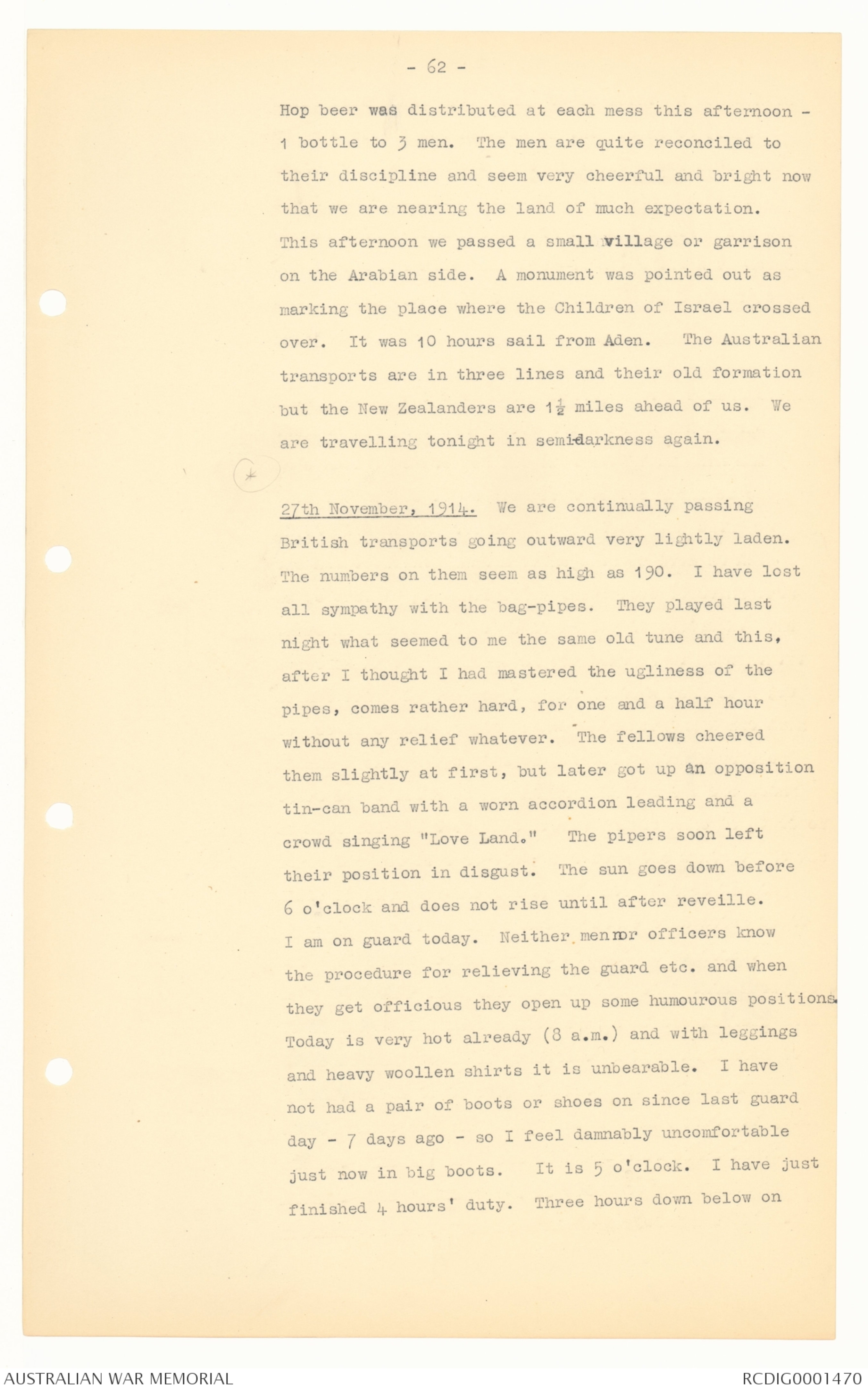
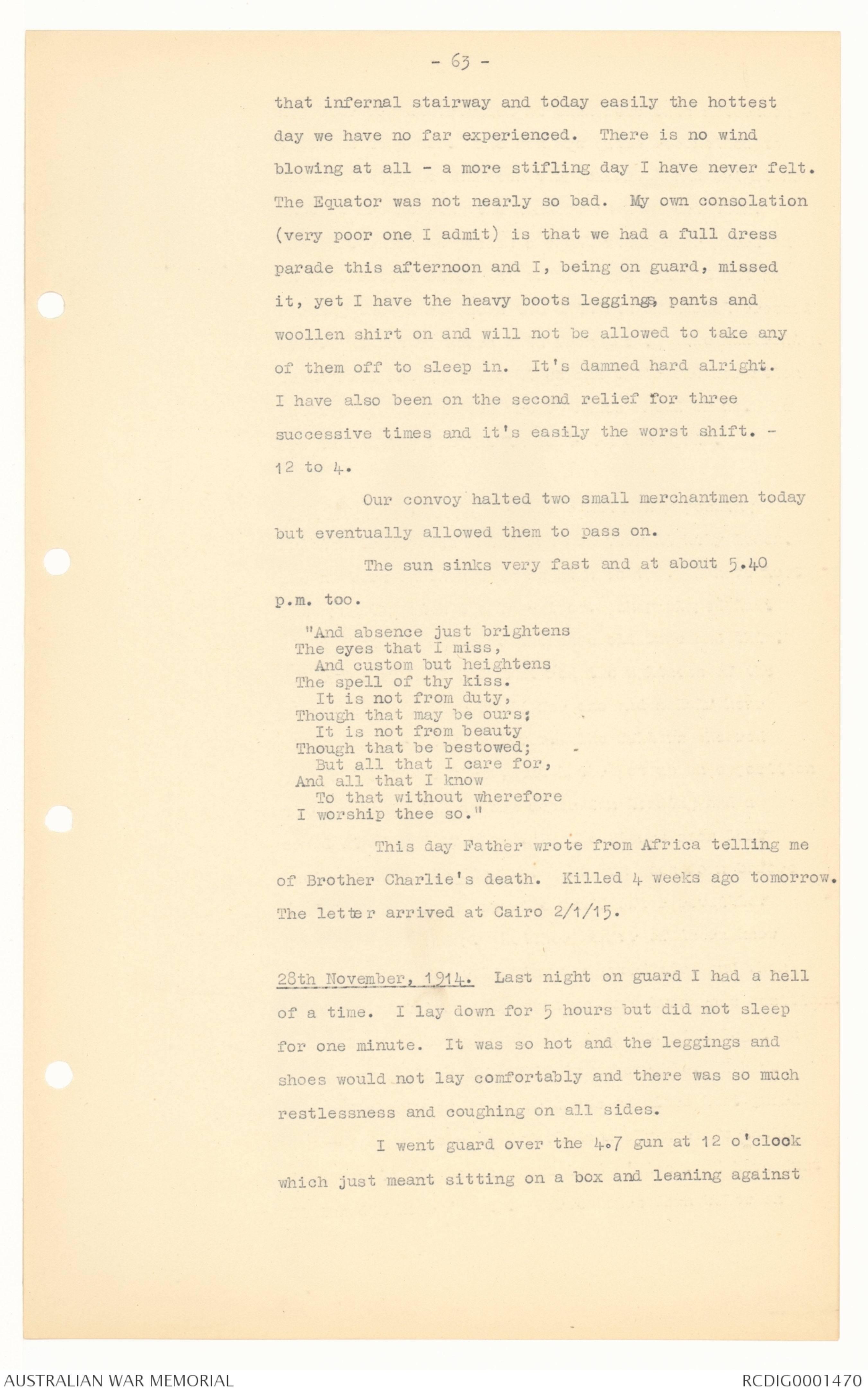
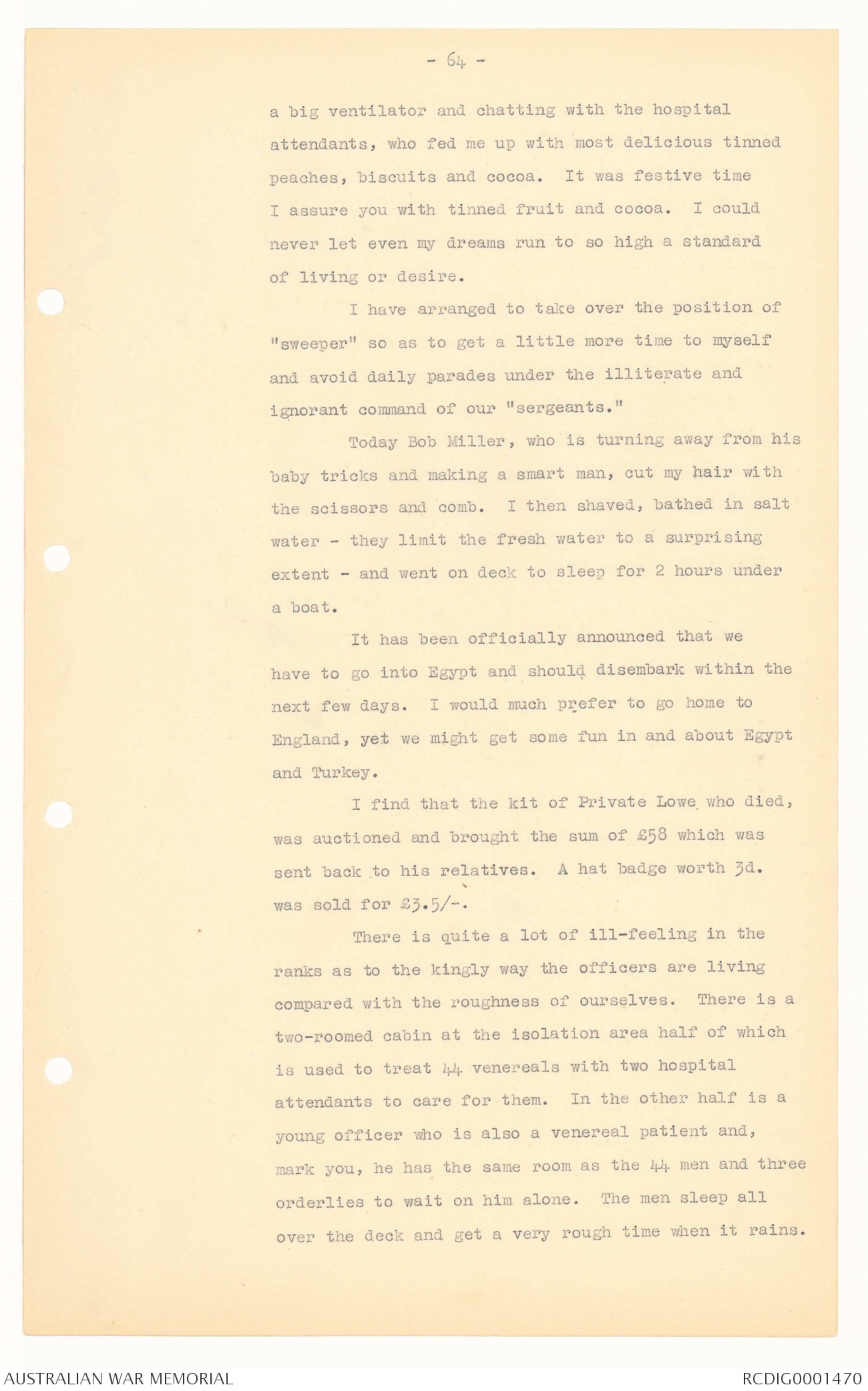
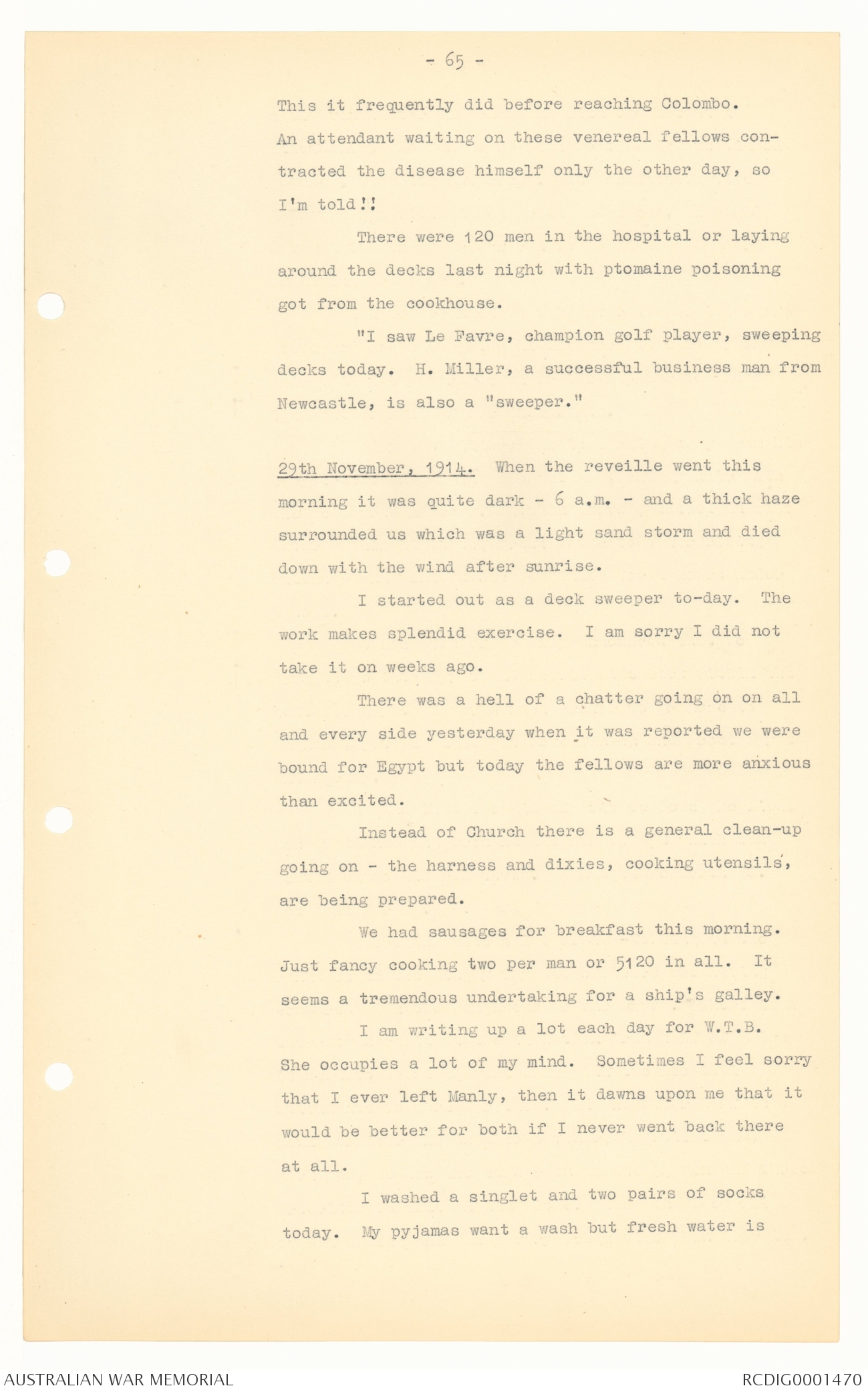
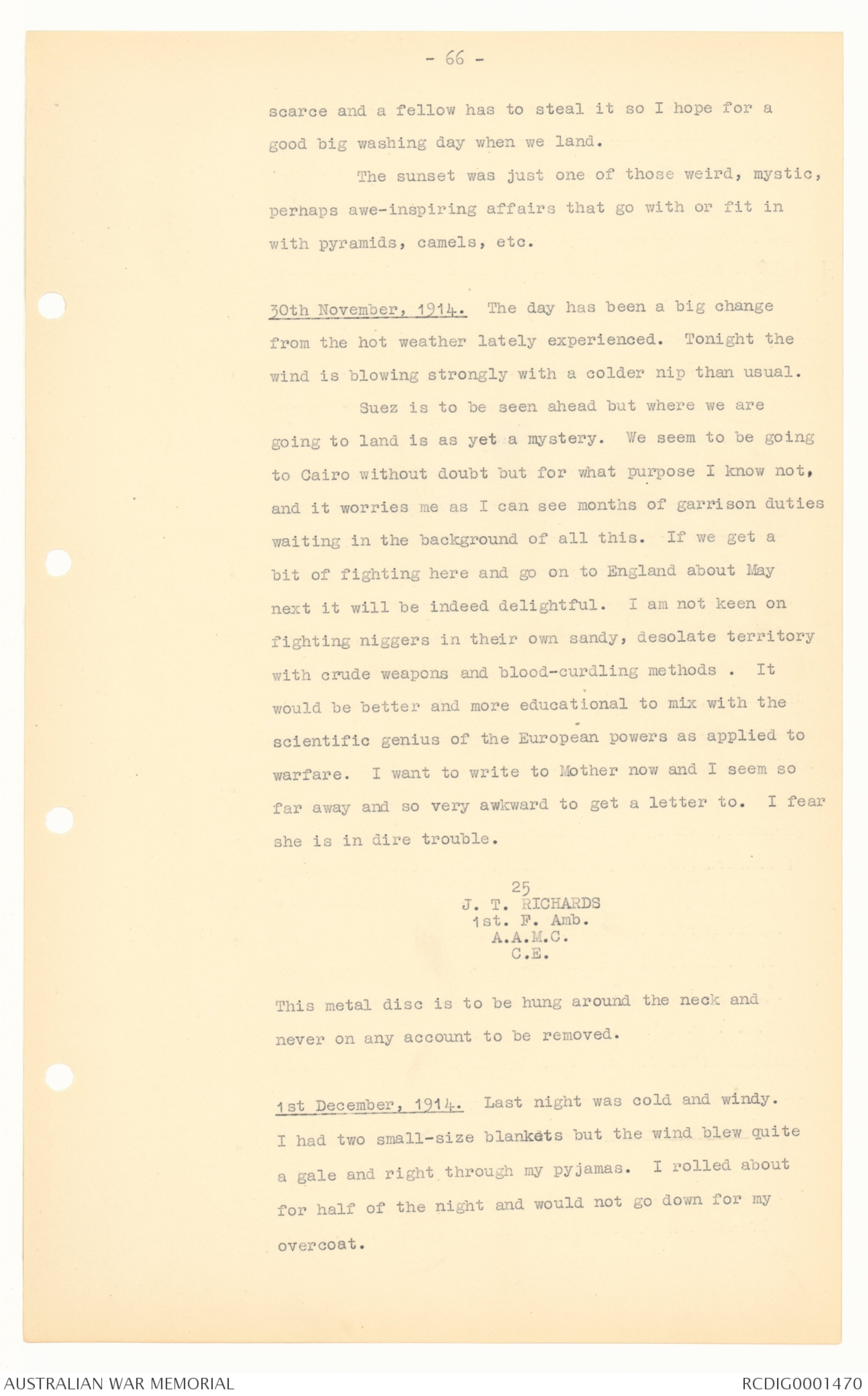
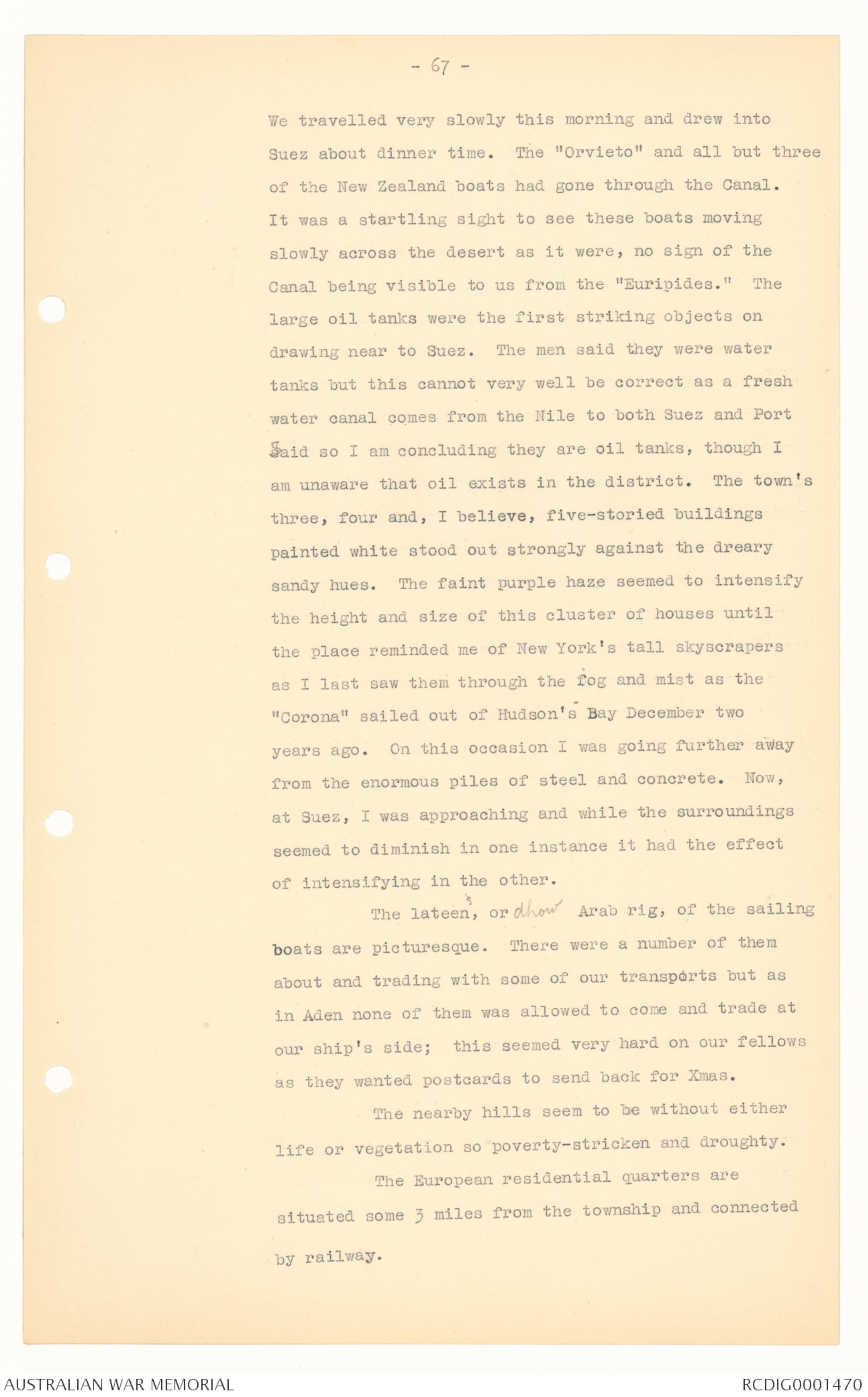
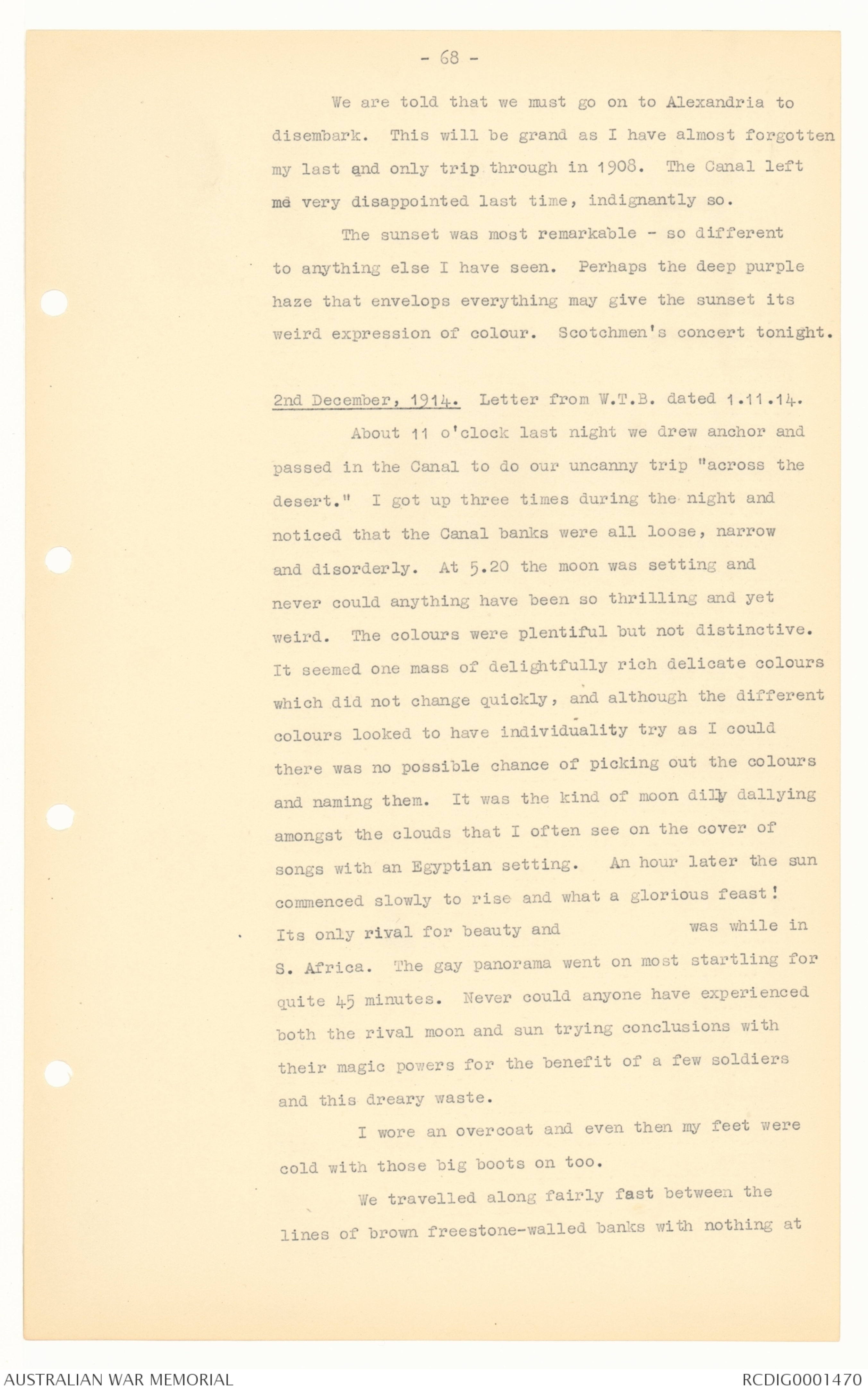
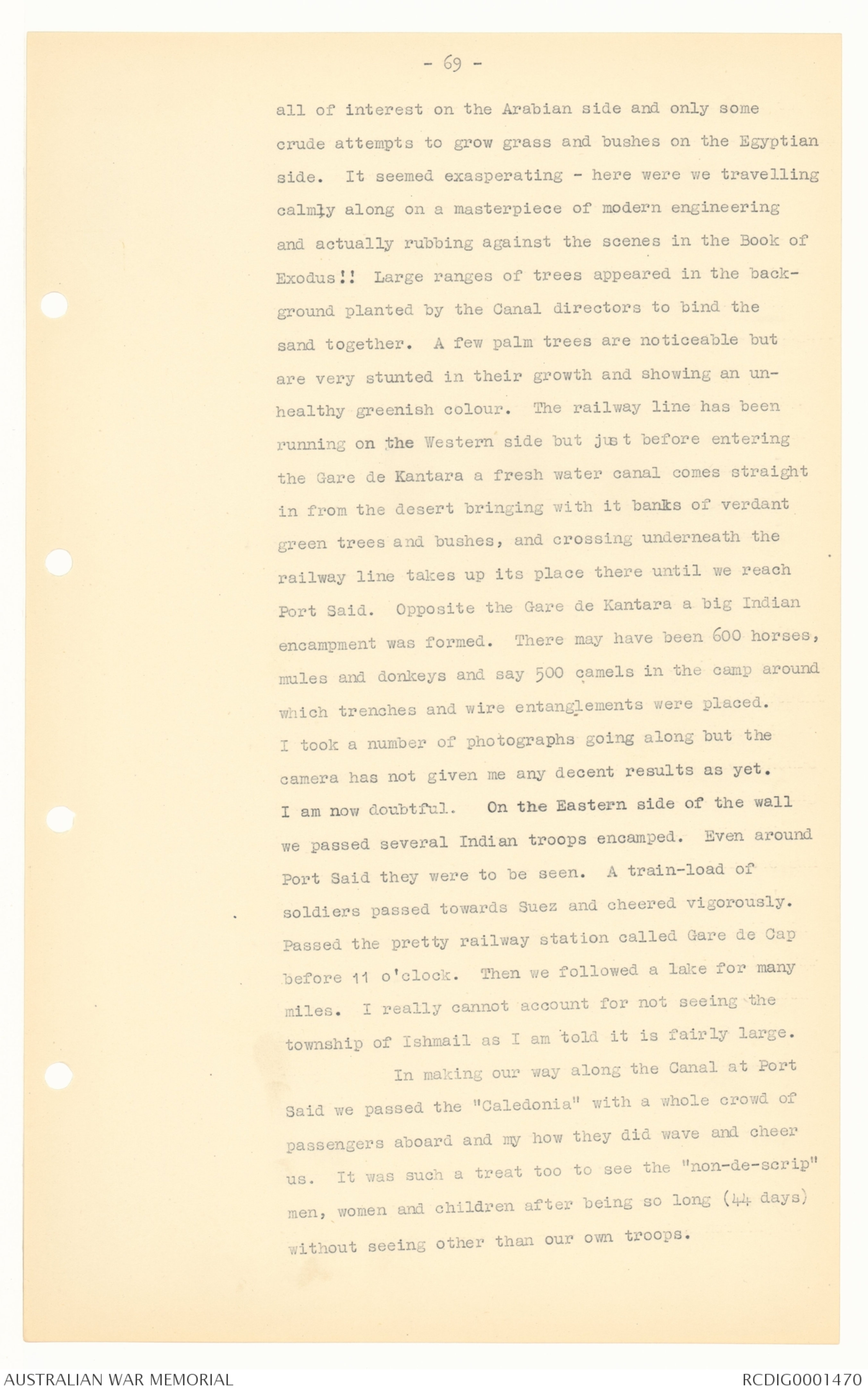
- 60 -
no parade in the morning nowadays but we are sent
out of our quarters at 1 o'clock to parade on physical
drill and bandaging work at 2 p.m. and remain until
4 p.m.
24th November, 1914. I have been too busy to enter
into any goings on of the ship today. I got 13 full
pages of writing done and posted by 8 p.m. to Arthur
Hollingsworth for the "Herald" or to whom he can sell
it. Failing a sale he will give it to the "Manly
Daily." Bob Miller good-naturedly copied it for me.
I should endeavour to write to and keep myself well to
the fore with the Manly people because should I go
back there again I may want a few friends etc.
25th November, 1914. We steamed past the jugged
outlined islands at Aden and anchored 1 mile from
the naval garrison's houses at 6 o'clock this morning.
On this morning's notices :-
"It is noticed that many men have long hair.
This is very unsoldierly and troops are asked to
give this matter their attention."
The Gulf of Aden is certainly a dreary, desolate place.
There was only the serrated edges of the mountains nearby
that gave any relief to the eyes. Even these
mountains were barren and dead-looking, while in the
distance could be dimly seen long, sandy stretches of
land. There were quite a number of ships anchored at
Aden - troopships amongst them too. The natives came
alongside with their boats to trade but were prevented
from selling by our officers. It seemed very hard on
our fellows but I expect there was some reason why this
was done. There were extra sentries posted all round
our vessel each with a round of ammunition and instructions
to fire on any craft that persisted in
coming within 50 yards.
-61-
There were a few Arabs only to be seen. I would love
to have seen a few hundred of them so as to judge
their average physique etc. as those I saw were poor
specimens - possibly as poor as the Cingalese. I
played bridge, one rubber, in the Sergeants' mess but
was terribly bored. The deck is not a bit hard nowadays
and I sleep very well indeed though I roll about some-
what.
26th November, 1914. This morning as the reveille blew
the sun was just half above the horizon and at the
same moment we steamed out of the Gulf of Aden and
into the Red Sea. We seem to have the whole of our
fleet with us and the British cruiser "Yarmouth" at
the head. Twenty Indian transports arrived at Aden
as we drew away. Altogether there were 60 transports
there at the one time. This number is official. The
coast of Arabia is close on our left side. The A.M.C.
do not drill in the morning and it is a hell of a job
to get somewhere to sit down. This morning I sat down
midships on a large pile of potatoes which have been
there for 6 weeks so you might well imagine the stink
of diseased potatoes that arose, and to make it 50 times
worse the sun beat terribly hot from the awning. It was
a sickly heat accelerated by the steam-pipes leading
to the winches. I could not do other than stick to it
but I will long remember the diabolical position.
We had another semaphore signalling drill this afternoon.
It is surprising what a little some of the fellows know
after so many weeks of practice. I have neglected it
myself, still it is very simple. As we left Aden
the Japanese cruiser "Abuki" sent us all sorts of good
wishes. She has been one of our escort since leaving
Albany. The "Sydney" was reported to be engaging a
fortress nearby. We are anxious awaiting her doing.
- 62 -
Hop beer was distributed at each mess this afternoon -
1 bottle to 3 men. The men are quite reconciled to
their discipline and seem very cheerful and bright now
that we are nearing the land of much expectation.
This afternoon we passed a small village or garrison
on the Arabian side. A monument was pointed out as
marking the place where the Children of Israel crossed
over. It was 10 hours sail from Aden. The Australian
transports are in three lines and their old formation
but the New Zealanders are 1½ miles ahead of us. We
are travelling tonight in semi-darkness again.
27th November, 1914. We are continually passing
British transports going outward very lightly laden.
The numbers on them seem as high as 190. I have lost
all sympathy with the bag-pipes. They played last
night what seemed to me the same old tune and this,
after I thought I had mastered the ugliness of the
pipes, comes rather hard, for one and a half hour
without any relief whatever. The fellows cheered
them slightly at first, but later got up an opposition
tin-can band with a worn accordion leading and a
crowd singing "Love Land." The pipers soon left
their position in disgust. The sun goes down before
6 o'clock and does not rise until after reveille.
I am on guard today. Neither men nor officers know
the procedure for relieving the guard etc. and when
they get officious they open up some humourous positions.
Today is very hot already (8 a.m.) and with leggings
and heavy woollen shirts it is unbearable. I have
not had a pair of boots or shoes on since last guard
day - 7 days ago - so I feel damnably uncomfortable
just now in big boots. It is 5 o'clock. I have just
finished 4 hours' duty. Three hours down below on
-63-
that infernal stairway and today easily the hottest
day we have no far experienced. There is no wind
blowing at all - a more stifling day I have never felt.
The Equator was not nearly so bad. My own consolation
(very poor one I admit) is that we had a full dress
parade this afternoon and I, being on guard, missed
it, yet I have the heavy boots leggings, pants and
woollen shirt on and will not be allowed to take any
of them off to sleep in. It's damned hard alright.
I have also been on the second relief for three
successive times and it's easily the worst shift. -
12 to 4.
Our convoy halted two small merchantmen today
but eventually allowed them to pass on.
The sun sinks very fast and at about 5.40
p.m. too.
"And absence just brightens
The eyes that I miss,
And custom but heightens
The spell of thy kiss.
It is not from duty,
Though that may be ours:
It is not from beauty
Though that be bestowed;
But all that I care for,
And all that I know
To that without wherefore
I worship thee so."
This day Father wrote from Africa telling me
of Brother Charlie's death. Killed 4 weeks ago tomorrow.
The letter arrived at Cairo 2/1/15.
28th November, 1914. Last night on guard I had a hell
of a time. I lay down for 5 hours but did not sleep
for one minute. It was so hot and the leggings and
shoes would not lay comfortably and there was so much
restlessness and coughing on all sides.
I went guard over the 4.7 gun at 12 o'clock
which just meant sitting on a box and leaning against
-64-
a big ventilator and chatting with the hospital
attendants, who fed me up with most delicious tinned
peaches, biscuits and cocoa. It was festive time
I assure you with tinned fruit and cocoa. I could
never let even my dreams run to so high a standard
of living or desire.
I have arranged to take over the position of
"sweeper" so as to get a little more time to myself
and avoid daily parades under the illiterate and
ignorant command of our "sergeants."
Today Bob Miller, who is turning away from his
baby tricks and making a smart man, cut my hair with
the scissors and comb. I then shaved, bathed in salt
water - they limit the fresh water to a surprising
extent - and went on deck to sleep for 2 hours under
a boat.
It has been officially announced that we
have to go into Egypt and should disembark within the
next few days. I would much prefer to go home to
England, yet we might get some fun in and about Egypt
and Turkey.
I find that the kit of Private Lowe who died,
was auctioned and brought the sum of £58 which was
sent back to his relatives. A hat badge worth 3d.
was sold for £3.5/-.
There is quite a lot of ill-feeling in the
ranks as to the kingly way the officers are living
compared with the roughness of ourselves. There is a
two-roomed cabin at the isolation area half of which
is used to treat 44 venereals with two hospital
attendants to care for them. In the other half is a
young officer who is also a venereal patient and,
mark you, he has the same room as the 44 men and three
orderlies to wait on him alone. The men sleep all
over the deck and get a very rough time when it rains.
- 65 -
This it frequently did before reaching Colombo.
An attendant waiting on these venereal fellows contracted
the disease himself only the other day, so
I'm told!!
There were 120 men in the hospital or laying
around the decks last night with ptomaine poisoning
got from the cookhouse.
"I saw Le Favre, champion golf player, sweeping
decks today. H. Miller, a successful business man from
Newcastle, is also a "sweeper."
29th November, 1914. When the reveille went this
morning it was quite dark - 6 a.m. - and a thick haze
surrounded us which was a light sand storm and died
down with the wind after sunrise.
I started out as a deck sweeper to-day. The
work makes splendid exercise. I am sorry I did not
take it on weeks ago.
There was a hell of a chatter going on on all
and every side yesterday when it was reported we were
bound for Egypt but today the fellows are more anxious
than excited.
Instead of Church there is a general clean-up
going on - the harness and dixies, cooking utensils,
are being prepared.
We had sausages for breakfast this morning.
Just fancy cooking two per man or 5120 in all. It
seems a tremendous undertaking for a ship's galley.
I am writing up a lot each day for W.T.B.
She occupies a lot of my mind. Sometimes I feel sorry
that I ever left Manly, then it dawns upon me that it
would be better for both if I never went back there
at all.
I washed a singlet and two pairs of socks
today. My pyjamas want a wash but fresh water is
- 66-
scarce and a fellow has to steal it so I hope for a
good big washing day when we land.
The sunset was just one of those weird, mystic,
perhaps awe-inspiring affairs that go with or fit in
with pyramids, camels, etc.
30th November, 1914. The day has been a big change
from the hot weather lately experienced. Tonight the
wind is blowing strongly with a colder nip than usual.
Suez is to be seen ahead but where we are
going to land is as yet a mystery. We seem to be going
to Cairo without doubt but for what purpose I know not,
and it worries me as I can see months of garrison duties
waiting in the background of all this. If we get a
bit of fighting here and go on to England about May
next it will be indeed delightful. I am not keen on
fighting niggers in their own sandy, desolate territory
with crude weapons and blood-curdling methods. It
would be better and more educational to mix with the
scientific genius of the European powers as applied to
warfare. I want to write to Mother now and I seem so
far away and so very awkward to get a letter to. I fear
she is in dire trouble.
25
J. T. RICHARDS
1st. F. Amb.
A.A.M.C.
C.E.
This metal disc is to be hung around the neck and
never on any account to be removed.
1st December, 1914. Last night was cold and windy.
I had two small-size blankets but the wind blew quite
a gale and right through my pyjamas. I rolled about
for half of the night and would not go down for my
overcoat.
-67-
We travelled very slowly this morning and drew into
Suez about dinner time. The "Orvieto" and all but three
of the New Zealand boats had gone through the Canal.
It was a startling sight to see these boats moving
slowly across the desert as it were, no sign of the
Canal being visible to us from the "Euripides." The
large oil tanks were the first striking objects on
drawing near to Suez. The men said they were water
tanks but this cannot very well be correct as a fresh
water canal comes from the Nile to both Suez and Port
Said so I am concluding they are oil tanks, though I
am unaware that oil exists in the district. The town's
three, four and, I believe, five-storied buildings
painted white stood out strongly against the dreary
sandy hues. The faint purple haze seemed to intensify
the height and size of this cluster of houses until
the place reminded me of New York's tall skyscrapers
as I last saw them through the fog and mist as the
"Corona" sailed out of Hudson's Bay December two
years ago. On this occasion I was going further away
from the enormous piles of steel and concrete. Now,
at Suez, I was approaching and while the surroundings
seemed to diminish in one instance it had the effect
of intensifying in the other.
The lateen^s, or dhow Arab rig, of the sailing
boats are picturesque. There were a number of them
about and trading with some of our transports but as
in Aden none of them was allowed to come and trade at
our ship's side; this seemed very hard on our fellows
as they wanted postcards to send back for Xmas.
The nearby hills seem to be without either
life or vegetation so poverty-stricken and droughty.
The European residential quarters are
situated some 3 miles from the township and connected
by railway.
- 68 -
We are told that we must go on to Alexandria to
disembark. This will be grand as I have almost forgotten
my last and only trip through in 1908. The Canal left
me very disappointed last time, indignantly so.
The sunset was most remarkable - so different
to anything else I have seen. Perhaps the deep purple
haze that envelops everything may give the sunset its
weird expression of colour. Scotchmen's concert tonight.
2nd December, 1914. Letter from W.T.B. dated 1.11.14.
About 11 o'clock last night we drew anchor and
passed in the Canal to do our uncanny trip "across the
desert." I got up three times during the night and
noticed that the Canal banks were all loose, narrow
and disorderly. At 5.20 the moon was setting and
never could anything have been so thrilling and yet
weird. The colours were plentiful but not distinctive.
It seemed one mass of delightfully rich delicate colours
which did not change quickly, and although the different
colours looked to have individuality try as I could
there was no possible chance of picking out the colours
and naming them. It was the kind of moon dilly dallying
amongst the clouds that I often see on the cover of
songs with an Egyptian setting. An hour later the sun
commenced slowly to rise and what a glorious feast!
Its only rival for beauty and was while in
S. Africa. The gay panorama went on most startling for
quite 45 minutes. Never could anyone have experienced
both the rival moon and sun trying conclusions with
their magic powers for the benefit of a few soldiers
and this dreary waste.
I wore an overcoat and even then my feet were
cold with those big boots on too.
We travelled along fairly fast between the
lines of brown freestone-walled banks with nothing at
- 69 -
all of interest on the Arabian side and only some
crude attempts to grow grass and bushes on the Egyptian
side. It seemed exasperating - here were we travelling
calmly along on a masterpiece of modern engineering
and actually rubbing against the scenes in the Book of
Exodus!! Large ranges of trees appeared in the background
planted by the Canal directors to bind the
sand together. A few palm trees are noticeable but
are very stunted in their growth and showing an unhealthy
greenish colour. The railway line has been
running on the Western side but just before entering
the Gare de Kantara a fresh water canal comes straight
in from the desert bringing with it banks of verdant
green trees and bushes, and crossing underneath the
railway line takes up its place there until we reach
Port Said. Opposite the Gare de Kantara a big Indian
encampment was formed. There may have been 600 horses,
mules and donkeys and say 500 camels in the camp around
which trenches and wire entanglements were placed.
I took a number of photographs going along but the
camera has not given me any decent results as yet.
I am now doubtful. On the Eastern side of the wall
we passed several Indian troops encamped. Even around
Port Said they were to be seen. A train-load of
soldiers passed towards Suez and cheered vigorously.
Passed the pretty railway station called Gare de Cap
before 11 o'clock. Then we followed a lake for many
miles. I really cannot account for not seeing the
township of Ishmail as I am told it is fairly large.
In making our way along the Canal at Port
Said we passed the "Caledonia" with a whole crowd of
passengers aboard and my how they did wave and cheer
us. It was such a treat too to see the "non-de-scrip"
men, women and children after being so long (44 days)
without seeing other than our own troops.
 Sam scott
Sam scottThis transcription item is now locked to you for editing. To release the lock either Save your changes or Cancel.
This lock will be automatically released after 60 minutes of inactivity.